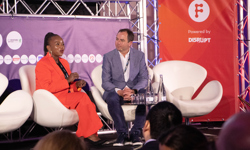
Fake News: people believe what they want to believe
Fake news, for a start, is not news. Mendacity in all its many forms, from the outright lie through the subtle evasion to the quiet omission of material information, has been around throughout my professional career and long before that.
Each generation, however, needs to believe it has invented the present and, therefore, fake news must be referred to as if it were a new invention.
If it is new, it’s in three main respects.
One, we have just lived through an explosion in the amount of information that people can access, largely without paying for it, and therefore it’s no surprise people have come to believe that the information is worth less and that the information which they can get away with describing as fake is worth nothing at all.
We’re all publishers now
Secondly, now that everybody with a Facebook or Instagram account is some kind of publisher, that means the general public has started practising the dark arts that we journalists used to feel were ours alone. They too have realised that in this new world, all that matters is the headline because hardly anyone reads the story.
Indeed, if you were to look back on the biggest scandals of the last year, the kind that have blighted or even ended the careers of bankers, actors or footballers, what they will all have in common is none of us will have read the original story from which the scandal grew. There has never been a time in human history when we have been aware of so many stories and have read so few of them. We have only encountered the edit of the story in which the longer version has been abbreviated, turned into a headline and weaponised with spin in order to advance somebody’s agenda.
Thirdly, we are in a sharing economy where the only information that truly matters is the information that people pass on to other people. Never before in my lifetime have we lived so much in the fear of the disapproval of our peers. For somebody like me, who grew up in the sixties and seventies when we shrugged at most things, the climate of public debate around everything from politics to celebrity is increasingly censorious. There’s a priggishness abroad which a Victorian would soon recognise. People pass news items on in order to say, “this is something I approve of wholeheartedly and therefore you are free to assume that I am a good person” or “this is something I condemn unreservedly and therefore you are free to assume I am a good person”. Nobody ever passes something along in order to say, “although I don’t know entirely what to make of this piece of information, it is undoubtedly interesting and you may find it helpful”.
Social media has turned us all into over-garrulous cab drivers, turning around in our seats when we should be watching the road ahead and offering ludicrously simple solutions to very complicated problems, solutions which always involve somebody else making a sacrifice rather than us. In the run-up to the election, my Twitter timeline seethes with 140 character slogans coined by friends and distant acquaintances which will not change the mind of one single person who reads them but are simply there to soothe the fevered brow of the person hunched over the keyboard. The voters of the United States took this one step further by putting a cab driver in the White House, figuring that somebody who appeared to be against the same things they were against must naturally be able to fix them.
Closed minds
There is no evidence that any of this fake news changes anybody’s mind about anything. It merely provides them with further justification for holding views that they hold already. People can’t be bothered to develop their own opinions; therefore, they borrow other people’s opinions that seem to be roughly in the same area as their own. That’s why the strongest newspaper brands in this country have always been the ones with the strongest grip on the prejudices of their readers and they come from all points of the political compass.
With fake news, as in life, we believe what we wish to believe. One of my jobs is on the council of the Advertising Standards Authority. Here we find we’re frequently called upon to rule in areas like health or slimming or gambling where people’s desire to believe the thing that is difficult to believe makes them vulnerable to claims which strain the bounds of credulity.
Sometimes, marketing takes the form of fake news. Because the Authority does not rule on political matters, we weren’t called upon to decide whether the claim made in the run-up to the EU referendum that the UK paid £350 million a week to the EU was an honest and accurate one. It’s an interesting case because it illustrates that if you’ve got a headline that a sufficient number of people want to buy into, you don’t need to spend any money on media because all you need to do is slap it on the side of one bus, call a press conference and the unpaid media will spread your claim for you. Of course, that only works if you make a claim so outrageous it takes the breath away. Donald Trump got elected by making precisely this kind of claim.
The same thing applied, albeit with less dire consequences, to the Fyre Festival. You may have read about this. This was supposed to take place in the Bahamas the other week. The promoters, who had never promoted anything before, claimed to be offering a five-star festival experience for millennials prepared to pay hundreds of dollars for a ticket. The Fyre Festival was marketed by recruiting two hundred social media influencers (or “Fyre Starters”) and promising them goods and services if they all blogged about the Fyre Festival at the same time. Because these people, who were mainly models, party people and those famous for being famous, have very few scruples about the things they lend their names to, they did so and tickets were sold.
Here you have to wonder at people’s naivety. The desire of the people who bought those tickets got the better of the common sense that should have told them that festivals mounted by people who have never mounted festivals before tend to be disasters. And this one was a disaster. In fact, it was called off before it could get started. Now customers are trying to get their money back and the beautiful young things who lent their names and bodies to the Fyre Festival’s promotion have melted like snow on a Bahamian beach.
Willing believers
Now, clearly, both this and the NHS message on the bus could only achieve traction if there were a sufficient number of credulous souls who were prepared to believe in them. And they believed in them because they wanted to. That’s what makes messages viral. That’s what makes fake news seem like news in the first place. It suits some people to believe it and, what’s more, to pass it on.
And we’re all guilty of this at some level. I have a new book out called Uncommon People and it’s about the rise and fall of the rock star. One of the things that defines a rock star is that we all think we know something about them. Keith Richards has his blood changed every year. Ozzy Osbourne bit the head off a bat. Keith Moon drove his Rolls into a swimming pool. Now all these are great stories which did a lot to increase the mystique around the people who were the subjects of them. The only disappointing thing about them is they’re not true. They’re fake news. They’ve all got a seed of truth about them but by the time I’ve explained the full version of the story, you’re no longer listening.
The truth is always just too complicated for most people, which is why they’re such suckers for something that appears to be the truth but isn’t. If it’s true, it’s not a story. If it’s a story, it’s not true. Remember that next time you’re trying to work out whether you’re looking at fake news or not.
Uncommon People: The Rise and Fall Of The Rock Stars is published by Bantam.










